Living in Dubai: Insights on Lifestyle and Real Estate
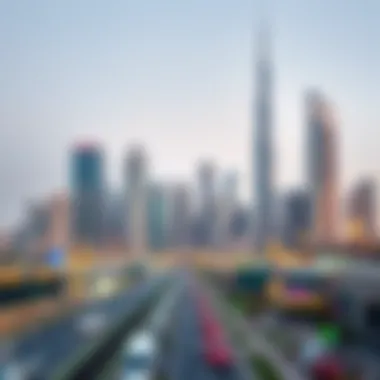
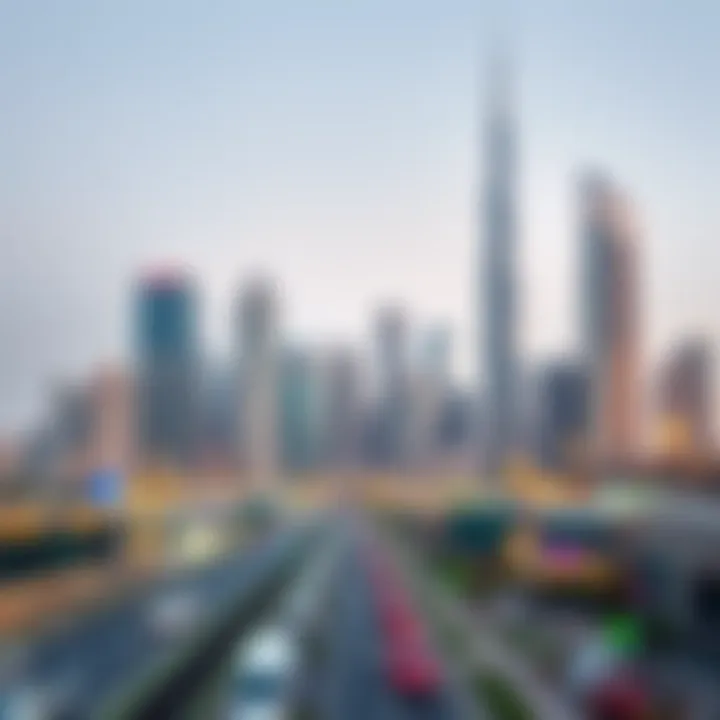
Intro
Living in Dubai isn't just about the glitz and glamour; it represents a unique blend of tradition and modernity. The bustling emirate is a melting pot of cultures, attracting people from all walks of life. Its ever-evolving landscape is characterized by architectural marvels and an ambiance that reflects innovation. As both a potential resident and an investor, understanding the various layers of this city is crucial.
The landscape of Dubai's real estate is an ever-changing beast. Hectic construction processes, shifting market demands, and economic factors can make navigating the terrain both challenging and exhilarating. Real estate becomes not only a home for many but also a lucrative business opportunity for astute investors. This article aims to dissect the intricate aspects of living in Dubai, providing an insightful guide tailored to those wishing to get their feet wet in this dynamic environment.
In this exploration, we aim to cover key pointers like current real estate trends and economic influences on property values, while also guiding prospective buyers through the intricacies of making sound investments. With this knowledge and information in hand, living and investing in Dubai can transform from a mere idea into a fruitful reality.
Understanding Dubai's Real Estate Ecosystem
Navigating the complexities of Dubai's real estate landscape is crucial for anyone looking to invest or reside in this bustling city. The dynamic nature of the market reflects a blend of opportunity and challenge that both seasoned investors and first-time buyers need to comprehend. Understanding the real estate ecosystem here does not only mean grasping numbers or trends; it's about recognizing the deep cultural and economic factors at play that influence this vibrant market.
The real estate sector in Dubai is not a mere reflection of property prices and availability. It encompasses various elements, such as market cycles, legal frameworks, and the nuanced needs of diverse communities. Potential investors or future residents must take into account factors like location desirability, demographic shifts, and global trends impacting both local and expatriate populations.
Given Dubai’s status as a major global player, its real estate market acts as a barometer for broader economic health. The ecosystem constantly evolves driven by economic diversification, the influx of foreign investment, and government initiatives aimed at attracting talent and capital. Engaging with this landscape offers not just profit, but an understanding of a city's ongoing transformation.
Market Overview
Dubai's real estate market has seen an impressive transformation over the years. Once known solely for its luxury villas and high-rise towers, the market now offers a plethora of options for various buyers and renters. From chic urban apartments in Downtown Dubai to sprawling family homes in developing suburbs, the choices cater to all kinds of demographics.
The market is largely divided into sectors:
- Luxury Real Estate: Properties such as those in Palm Jumeirah or Emirates Hills exemplify opulence and exclusivity.
- Mid-market Housing: Areas like Jumeirah Village Circle have emerged as attractive options for families and young professionals.
- Affordable Housing Initiatives: Government-led projects that focus on providing budget-friendly living spaces have gained traction.
Monthly trends indicate fluctuating prices, but the arrival of Expo 2020 sparked an uptick in demand, pulling international buyers into the fold. Overall, market dynamics remain influenced by local auctions, sales, and the regulatory framework set forth by the government, ensuring a stable and inviting environment for investments.
Key Players in the Market
The real estate scene in Dubai is populated by a mix of key players, each playing their part in shaping the market dynamics.
- Developers: Major players like Emaar Properties and Damac Properties drive new projects and innovations, each contributing unique offerings to the skyline of Dubai.
- Real Estate Agents: Companies such as Allsopp & Allsopp or Betterhomes simplify navigation through options, providing valuable insights into trends and neighborhoods.
- Investors: Diverse investors, ranging from high-net-worth individuals to institutional funds, contribute to a competitive landscape.
- Government: Regulatory bodies ensure a fair playing field while promoting transparency. Initiatives aimed at attracting foreign investors have made Dubai a hub for international real estate investment.
Maintaining awareness of these influences helps prospective buyers and investors foresee market movements and capital trends. Genuine engagement with these players gives one a leg up in understanding the overall ecosystem.
Investment Trends
In recent years, several noticeable trends have emerged in Dubai's real estate investment landscape, shedding light on where the smart money is heading.
- Shift Toward Off-Plan Properties: Investors are increasingly leaning towards off-plan properties due to the potential for capital appreciation, capitalizing on projected future values.
- Sustainability Awareness: Eco-friendly constructions are a growing trend as awareness for green living increases. Projects that incorporate sustainable technologies often attract premium pricing and appeal to a more conscious market.
- Co-living and Co-working Spaces: With the rise of the gig economy and more freelancers, there’s been a surge in demand for co-living solutions as well as co-working spaces, reflecting a shift in lifestyle preferences.
- Diversified Living Options: From freehold developments for expatriates to leasehold options, investors are more inclined to diversify their portfolios with a mix of residential, commercial, and industrial properties.
Understanding these trends is vital for anyone looking to make informed decisions in this fast-paced market. They not only highlight potential opportunities for investors but also provide a roadmap for future developments in the ever-evolving landscape of Dubai's real estate sector.
Neighborhood Insights
Understanding the neighborhoods of Dubai is fundamental to grasping the full spectrum of what life in this dynamic city has to offer. Each area is a world of its own, reflecting distinct lifestyles, cultures, and opportunities. For investors, real estate agents, and potential homebuyers, getting familiar with these neighborhoods is not just a matter of preference; it’s crucial for making informed decisions. These insights into various locales can lead to better investments and enhance life quality.
High-End Living: Dubai Marina
Dubai Marina stands out as a beacon of luxury living. This area, filled with breathtaking skyscrapers and waterfront views, appeals to both foreign expatriates and wealthy Emiratis. The environment is often buzzing with energy, providing an array of glamorous options for leisure and entertainment.
One striking feature of Dubai Marina is its accessibility. The Marina Walk, a picturesque promenade, offers a range of dining options—from upscale restaurants to trendy cafes. Residents here benefit from a vibrant lifestyle, combining work and play in an illustrious setting. The area is also home to high-end retail outlets, making shopping a delightful experience.
While the allure of luxury can be enticing, it's important to keep in mind the higher property prices and living expenses that come with the territory. Additionally, the busy atmosphere may not suit everyone, particularly those who prefer a more tranquil environment. Still, for those who thrive in an energetic community, Dubai Marina can feel like the center of the universe.
Cultural Hub: Al Fahidi District
On the opposite end of the spectrum lies the Al Fahidi District, or historically known as Bastakiya. This neighborhood provides a window into Dubai's rich history and culture. With its narrow lanes and traditional wind-tower architecture, the area seems to whisper stories of the past.
Living in Al Fahidi means embracing the charm of heritage. This district hosts art galleries, museums, and cultural institutions that highlight the UAE's artistic journey. The annual celebrations and events here create a sense of community among residents, allowing for deeper connections.
However, potential residents should consider the lack of glitz and glamour that might come as a shock if they have only experienced Dubai Marina. Al Fahidi may lack modern amenities found in newer neighborhoods, but what it offers as an intimate, culturally rich atmosphere can certainly compensate for that.
Family-Friendly Communities: Arabian Ranches
For those looking to settle down with families, Arabian Ranches is a community designed with family living in mind. This suburban area promotes an inviting atmosphere with plenty of green spaces and parks. Here, families can enjoy safe environments, schools, and community activities that enhance quality of life.
Arabian Ranches houses offer a wide variety of sizes and styles, catering to different needs. The neighborhood is well-planned, creating a sense of seclusion while still maintaining access to Dubai's commercial offerings. One of the most appealing aspects is the presence of reputable schools nearby, which relieves parents of long commutes for their children’s education.
Nevertheless, the suburban lifestyle may come with trade-offs, particularly in transport. Those working in the bustling business districts may find the commute a bit cumbersome. Still, the strong community vibe and amenities often outweigh these inconveniences for many families.
"In Dubai, choosing a neighborhood is more than just finding a home; it’s about aligning lifestyle, culture, and values with the vibrant pulse of the city."
Legal Framework for Residents
Understanding the legal framework for residents in Dubai is crucial for anyone considering living or investing in this dynamic city. The laws governing property ownership, rental agreements, and residency are not just bureaucratic details; they shape the way communities thrive and how investments flourish. A solid grasp of these elements can streamline the transition and enhance the experience of living in this cosmopolitan metropolis.
Property Ownership Rights
In Dubai, property ownership rights are defined by a set of regulations that cater primarily to expatriates and investors. The most notable distinction is between freehold and leasehold properties. Freehold properties allow buyers to own the property and the land outright, an attractive option for many expatriates. This ownership thrusts open the doors to further financial opportunities, including resale rights, thus increasing the allure of Dubai as a property investment hub.


On the flip side, leasehold properties permit ownership for a specified duration, often 99 years. While this may sound restrictive, it still provides a significant advantage for those looking to reside in prime areas without the hefty price tag of freehold properties. Understanding these distinctions not just arms residents with rights but also with responsibilities, as the law mandates adherence to specific maintenance and community guidelines.
"Property ownership in Dubai signals not just investment, but a commitment to the city’s future."
Rental Regulations
Rental regulations are another fundamental aspect of life in Dubai, and they create a balance between landlords and tenants. Lease contracts are legally binding documents that outline obligations such as payment schedules and maintenance responsibilities. The laws clearly stipulate that landlords cannot arbitrarily increase rent; increases must comply with the Rent Increase Guideline set forth by the Dubai Land Department.
It’s vital to note that the eviction process is a legal affair. Landlords must adhere strictly to the laws, which protect tenant rights while enabling landlords to manage their properties effectively. On the tenant's side, stability is often sought; therefore, the regulations aim to provide a fair environment where both parties know their rights. Failure to comply with these rules can lead to hefty penalties, so awareness is key.
Visa and Residency Guidelines
Visa and residency guidelines in Dubai are shaped with the aim to adapt to the city's evolving demographic landscape. Various visa categories exist, catering to different segments of the population, from skilled professionals to students. Not-for-profit residency programs or golden visas provide long-term residency for investors and professionals working in key sectors. This shift towards inclusivity opens up opportunities for a wider range of residents.
Obtaining residency is not a winding road; however, understanding the nuanced requirements is just as vital. It typically involves proving employment, securing housing, and sometimes undergoing a health check. Importantly, residents should be aware of their residency status as it influences their legal rights, property investments, and everyday life in Dubai.
As the landscape evolves, staying informed about changes in visa policies ensures that residents can navigate these waters smoothly and capitalize on opportunities that arise.
Cost of Living in Dubai
Understanding the cost of living in Dubai is crucial for anyone considering making this vibrant city a home. Not only does it play a significant role in lifestyle choices, but it also deeply influences the economic decisions for both residents and potential investors. Given Dubai's reputation as a global city, its cost structure encompasses several unique components, from housing to utilities, that vary widely depending on location, standards of living, and personal preferences.
By examining the cost of living, individuals can gauge their purchasing power, plan their budgets wisely, and identify areas that promise both lifestyle satisfaction and financial prudence. Knowing what to expect financially arms you with the knowledge to make informed choices, whether you’re looking to rent an apartment in the bustling center or aiming to settle down in one of the quieter neighborhoods.
Housing Expenses
Housing expenses in Dubai can be a big slice of the monthly budget pie. Rent varies dramatically across different neighborhoods. For instance, living in the luxury Dubai Marina can cost significantly more than settling in the suburban areas like Arabian Ranches. The average rent for a one-bedroom apartment in the Marina is approximately AED 10,000 to AED 15,000 per month, compared to AED 5,000 to AED 8,000 in less central areas.
When considering buying property, it's vital to factor in not just purchase prices but also custom duties and maintenance fees, which are quite common here. New developments often include additional charges. There are too many people out there who underbudget for their housing. Consequently, choosing the right area and property type is of utmost importance.
Utilities and Services
Next on the expense radar are utilities and services. Electricity, cooling, and water bills can understandably fluctuate depending on usage, especially with the intense heat during summer months. Average utility costs may reach around AED 1,000 per month for a typical one-bedroom apartment, which can be quite the eye-opener for newcomers.
Moreover, services like internet and mobile phone plans can be an added cost. With numerous providers in the market, careful comparison shopping can save money. Ultimately, budgeting about AED 400 to AED 800 for these services is prudent to maintain a comfortable lifestyle. These numbers can, of course, vary based on one's lifestyle and digital habits, from cord-cutters to streaming fanatics.
Transportation Costs
Transportation can differ remarkably, often depending on one’s commuting style. Public transport in Dubai, including the Metro, is quite affordable and efficient, making it easier for many residents to navigate the city without relying on personal vehicles. A monthly pass for metro usage will set you back around AED 300, while a single trip can cost as little as AED 3.
On the flip side, owning a car does introduce a new layer of expenses—fuel costs, car insurance, and registration fees should all be accounted for. Fuel prices in Dubai are fairly reasonable, typically under AED 3 per liter. However, the initial investment in buying a vehicle and maintaining it could start around AED 60,000 for a decent compact model.
Ultimately, residents must ponder how they prefer to get around, whether it's through public transport or personal car, as each choice comes with its own corresponding costs.
When budgeting for living in Dubai, keeping an eye on the small costs can help avert significant financial surprises down the line.
Cultural Life and Community Engagement
Cultural life and community engagement are at the heart of what makes living in Dubai a unique experience. The richness of its cultural tapestry helps embed individuals from various backgrounds into a unified community, which is essential for both residents and newcomers alike. That blend of traditional values and modernity creates an environment fostering connections and shared experiences. This section explores how cultural endeavors, culinary diversity, and community initiatives contribute to the lifestyle of Dubai.
Cultural Festivals and Events
Dubai hosts a plethora of cultural festivals and events throughout the year. From the Dubai Shopping Festival, which attracts visitors with its blend of entertainment and shopping, to the Dubai Food Festival, showcasing the culinary richness of the city, there is something happening almost daily. Different cultures openly celebrate their traditions, giving residents a chance to experience festivals like Diwali, Eid, and the Chinese New Year.
Engaging in these events allows residents to immerse themselves in the vibrant local culture, promoting social cohesion. Participation fosters inclusivity, breaking down barriers between various communities while providing a platform for artistic expression.
"Cultural events represent a dynamic ocean of shared experiences, where residents can connect on a deeper level than mere transactions."
Highlights often include parades, music performances, and workshops that invite people to not only observe but participate actively. The vibrancy of these festivals also holds lucrative potential for businesses and brands seeking to tap into diverse markets, leading to longer-term local engagement.
Dining and Cuisine Diversity
The culinary scene in Dubai is a true reflection of its multicultural population. With restaurants serving up dishes from every corner of the globe, from Ethiopian to Japanese cuisine, residents and visitors alike enjoy a rich tapestry of flavors. Food is more than sustenance; it serves as a bridge connecting different cultures.
The restaurant scene is constantly evolving with new concepts and innovative dining experiences emerging every week. Food markets, casual cafes, and fine dining establishments coalesce to offer something for everyone’s palate.
- Some notable culinary hotspots include:
- Jumeirah Beach Residence – vibrant with beachside eateries and high-end dining options.
- Deira – where you can find authentic local fare in bustling traditional markets.
- Global Village – showcases international cuisines in a vibrant setting especially during the winter months.
Eating out is often a social event, where families and friends gather to share stories and make memories. Food festivals further enhance this diversity, allowing chefs and food enthusiasts to showcase their creations in a celebratory atmosphere.
Community Initiatives and Programs
Community initiatives in Dubai serve as vital threads of connection. Programs aimed at promoting social responsibility and engagement flourish, ensuring that even as the city grows, its residents remain grounded in shared values.
Local non-profits and government programs spearhead numerous initiatives. For instance, the Community Development Authority in Dubai promotes social well-being by fostering community ties. Initiatives like beach clean-ups, charity fundraising, and cultural exchange programs enrich the community fabric.
- Benefits of these initiatives include:
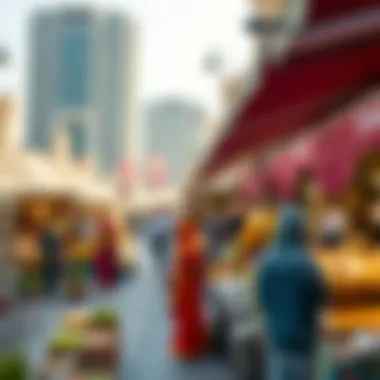
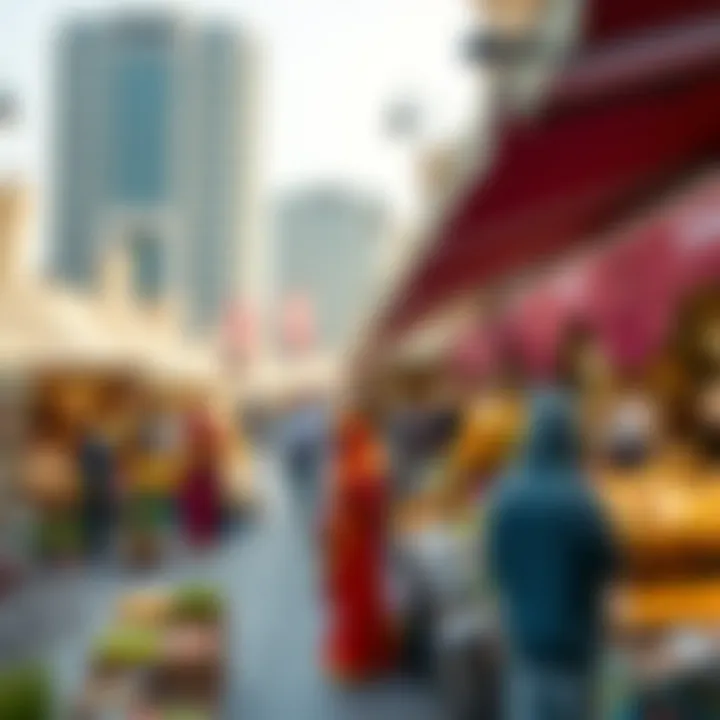
- Fostering Community Spirit: They bring residents together, nurturing empathy and understanding among diverse populations.
- Educational Outreach: Programs often include workshops, teaching both practical skills and cultural awareness.
- Volunteering Opportunities: Encourage residents to give back, making a tangible impact on society.
Engaging with these programs offers residents a chance to positively influence their surroundings while enhancing their personal growth through teamwork and collaboration.
Living in Dubai is not just about the concrete and glass; it embodies a melting pot of culture that constantly evolves, creating a shared experience that leaves an indelible mark on the city's inhabitants.
Education and Healthcare Systems
In the heart of any thriving metropolis, education and healthcare take center stage. For Dubai, these sectors are not just pivotal; they’re the foundation on which many expats and investors base their decisions to move or invest. A well-educated populace and robust healthcare infrastructure play a significant role in defining the city's appeal. This section will explore the educational offerings and healthcare facilities available, ensuring a comprehensive understanding of what life in Dubai encompasses.
International Schools and Curriculum Options
Dubai is a melting pot of cultures, and this diversity is reflected in its educational institutions. The city boasts a plethora of international schools that cater to various curricula, including British, American, Indian, and even the International Baccalaureate. Parents often prioritize these options when relocating, as the quality of education is a significant consideration for families.
As an example, schools like the Dubai British School offer a British curriculum, preparing students for IGCSEs and A-levels. On the other hand, institutions like the American School of Dubai focus on a U.S. curriculum, ideal for expatriate families who plan to eventually return home.
Here are some key factors to consider when choosing a school in Dubai:
- Curriculum Type: Ensure it aligns with your child's future educational goals.
- Accreditation: Look for schools which are accredited by recognized bodies to ensure quality.
- Facilities and Extracurricular Activities: Consider the resources available that support comprehensive development.
Healthcare Facilities and Access
Healthcare is another crucial aspect of life in Dubai. The city is known for its state-of-the-art hospitals and clinics, providing world-class medical services. Facilities like the Cleveland Clinic Abu Dhabi are renowned globally for their advanced technologies and expert staff, providing residents access to top-notch healthcare.
In addition to hospitals, Dubai also has numerous pharmaceutical outlets and urgent care centers scattered across the city, ensuring that residents have ready access to healthcare services. The government has put a strong emphasis on healthcare accessibility, making it one of the key areas of development.
Factors to consider regarding healthcare in Dubai include:
- Insurance Coverage: Many employers provide health insurance, but understanding its extent matters.
- Availability of Specialists: Research the types of specialists available for specific health needs.
- Waiting Times: Larger hospitals might have longer wait times, so a smaller clinic could suit immediate needs.
Quality of Life Assessments
When evaluating the quality of life in Dubai, education and healthcare serve as critical metrics. According to various assessments, Dubai ranks high on quality of life indicators, appealing not just to families but to professionals as well. The combination of excellent educational facilities and healthcare creates a conducive environment for both individual and community growth.
Quality of life assessments often take into account:
- Safety and Security: The UAE is known for its low crime rates, adding to its appeal as a place to live.
- Access to Amenities: Proximity to schools, hospitals, parks, and shopping areas can enhance daily living.
- Work-Life Balance: Availability of flexible working hours and recreational spaces supports a balanced lifestyle.
"In a city where skyscrapers define the skyline, the true measure of success is the well-rounded development of its residents."
Ultimately, understanding the intricacies of Dubai's education and healthcare systems can provide valuable insights for potential investors or individuals considering making this vibrant city their home. Ensuring that your family has access to the best educational and health facilities is paramount, making these sectors crucial when navigating life in Dubai.
Real Estate Investment Strategies
Navigating the dynamic landscape of real estate in Dubai requires a well-thought-out investment strategy. The significance of developing effective strategies cannot be overstated, as the city presents both remarkable opportunities and considerable challenges. As potential investors or current property owners, having a firm grasp of investment strategies not only facilitates informed decision-making but also enhances the likelihood of securing profitable ventures. This section will delve into essential elements of real estate investment strategies, emphasizing their importance in achieving sustainable growth in a fast-paced market.
Identifying Profitable Areas
One of the cornerstones of any successful investment strategy is identifying profitable areas within the market. Dubai's real estate scenario is multifaceted, with pockets of high demand and enticing yields scattered across its various neighborhoods. When scouting for lucrative areas, investors should consider:
- Location: Proximity to central business districts, malls, schools, and transportation hubs can significantly impact property value.
- Emerging Developments: Areas undergoing infrastructural and developmental growth, like Dubai South and the Dubai Creek Harbour, often promise future returns on investment.
- Market Trends: Pay attention to shifting demographics and lifestyle preferences that can create new opportunities, like increased demand for family-oriented communities.
An investor who makes data-driven decisions rooted in comprehensive research often finds hidden gems in the city’s ever-shifting landscape. Moreover, utilizing tools such as property valuation services or consulting local real estate experts can yield critical insights that guide investors in their decision-making process.
Understanding Market Cycles
Equally important to identifying profitable areas is a deep understanding of market cycles. Real estate is unique in that its cycles can significantly influence buying patterns, pricing strategies, and overall market sentiment. An overview of the market cycles includes:
- Expansion Phase: During this period, prices rise as demand outpaces supply. It's a time when many investors flood the market, looking to capitalize on rising property values.
- Peak Phase: At this stage, prices are at their highest, and investment opportunities may become limited. Investors should proceed with caution as indicators of an impending downturn may begin to surface.
- Recession Phase: Property values decline as buyer sentiment wanes. This can present opportunities for savvy investors to acquire distressed properties at lower prices.
- Recovery Phase: As the market begins to stabilize, prices gradually inch upwards again, attracting investor confidence.
Investors should stay informed about national economic indicators and geopolitical issues, as these can heavily influence the cycles. Being adept in spotting the phase of the market cycle allows investors to time their investments strategically, reaping rewards while mitigating potential losses.
Risk Management Approaches
Every investment carries its share of risks. In Dubai's unpredictable real estate market, risk management is vital to safeguard an investor's portfolio. Without a solid risk management strategy, even the shrewdest investor may find themselves in turbulent waters. Here are critical approaches to consider:
- Diversification: Just like putting all eggs in one basket isn’t wise, solely investing in a single type of property can be risky. Spread investments across various types of assets, such as commercial, residential, and vacation rentals, to minimize risk.
- Regular Market Analysis: Stay updated on market trends and changes in regulations that may affect property values. Establishing a systematic approach for reviewing market conditions regularly can enhance responsiveness to changes.
- Insurance and Legal Protections: Ensure properties are adequately insured, and always engage legal professionals to review contracts. This provides a safety net against unexpected events or disputes that could derail investments.
Incorporating these risk management techniques into one’s real estate strategy not only safeguards assets but also enhances overall investment resilience, allowing sound decisions even during uncertain times.
"In the game of real estate, knowledge is power. It's essential to know the landscape and the players to navigate successfully."
In summary, real estate investment in Dubai can be highly rewarding with the right strategies in place. Identifying profitable areas, understanding market cycles, and instituting effective risk management approaches create a robust foundation for success in this vibrant marketplace.
Sustainable Living Initiatives
The rapid urban development in Dubai has not only transformed its skyline but also raised pressing questions about sustainable living. As the city attracts more residents, addressing ecological impact and resource management has become pivotal. Those living in Dubai, whether locals or expatriates, are increasingly focused on sustainable living. This movement essentially encapsulates efforts to minimize the carbon footprint while enhancing quality of life. Nations, including the UAE, are recognizing the necessity to embrace environmentally conscious practices as part of a long-term strategy. In this light, let's delve into crucial components impacting sustainable living in this bustling metropolis.
Green Building Standards
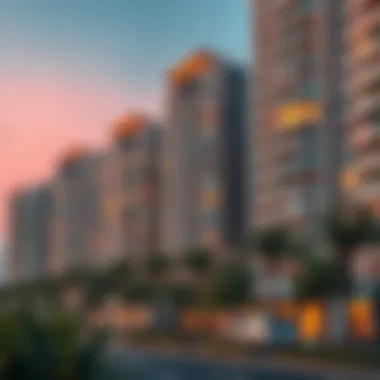
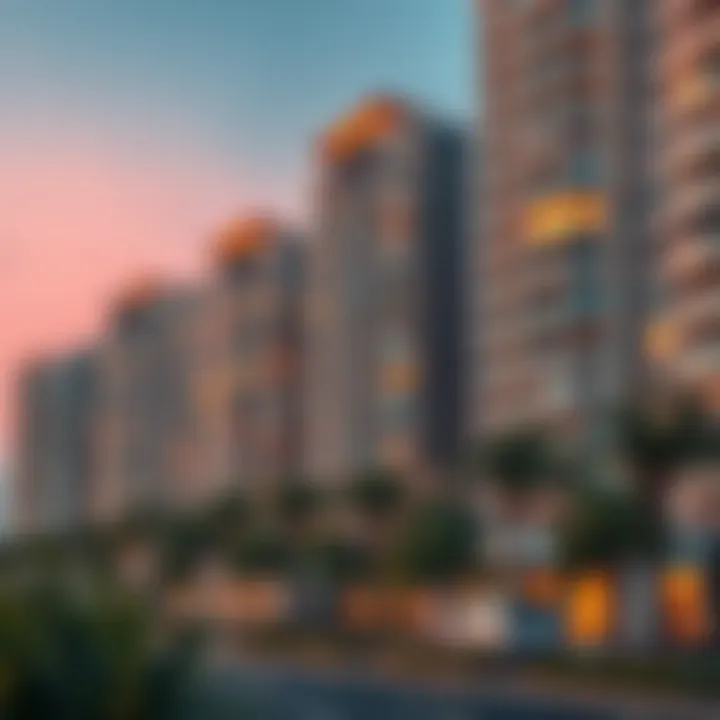
Green building standards in Dubai are not just a trend; they represent an essential shift towards sustainability in construction. These standards are regulated by Dubai Municipality, promoting practices that favor energy efficiency, water conservation, and the use of environmentally friendly materials. Projects like the Sustainable City and Dubai Design District demonstrate how buildings can be designed to lower energy consumption and utilize renewable resources.
For instance, using materials that have a lower environmental impact or ensuring that adequate insulation is in place reduces the need for heating and cooling systems. Moreover, the use of solar panels and rainwater harvesting systems is becoming more common. These choices not only contribute to environmental preservation but can also lead to long-term cost savings for residents. Residents are recognizing that by choosing to live in structures adhering to these green guidelines, they contribute positively to their neighborhoods, thus knitting a narrative of sustainability at a community level.
Community Sustainability Programs
Community sustainability programs in Dubai are flourishing as local government and private sectors collaborate to promote environmental stewardship. Initiatives like the Dubai Clean Energy Strategy 2050 aim to make Dubai a center of clean energy and green economy. What does it mean for people living here? Well, you see initiatives often rolling out at the grassroots level too.
Residents are encouraged to partake in various projects, such as tree planting days and beach clean-ups, which not only enhance the environment but also foster a sense of belonging and community spirit. Additionally, community gardens are popping up across neighborhoods. These spaces not only provide fresh produce but also create opportunities for residents to engage with each other, sharing both cultivation practices and cultural traditions.
Sustainable living isn't simply about one-off actions; it's about creating a culture of responsibility and shared goals, leading to stronger bonds between neighbors.
Future Trends in Eco-friendly Investments
Looking ahead, the trends in eco-friendly investments indicate a significant shift in how developments are approached. Investors are increasingly seeing the value in sustainability, not just for environmental reasons but for economic viability too. Eco-friendly developments are poised to appreciate in value as demand surges for homes with sustainable features. This spike is particularly evident among younger generations who prioritize these elements.
Moreover, with a growing number of developers integrating smart home technologies that monitor and manage energy usage, future residents can expect homes that are not just eco-conscious but also tech-savvy. Think smart meters and automated systems that ensure efficient energy consumption while balancing comfort and convenience.
Furthermore, potentials in areas focused on sustainable public transport projects mean reduced reliance on personal vehicles for everyday commutes.
In this context, real estate investors and developers are urged to keep an eye on evolving regulatory standards and community preferences. With the focus on ambitious environmental goals by the government, it becomes evident that investments aligned with sustainability will likely see robust returns.
As Dubai advances, the integration of sustainable living initiatives will not just define the urban landscape but will also shape a lifestyle that appeals to current and future generations. This ongoing evolution might be the fingerprint of a city striving for balance between rapid growth and environmental stewardship.
Challenges in the Dubai Real Estate Market
Navigating the intricacies of Dubai's real estate landscape presents both opportunities and hurdles. Understanding the challenges is crucial for anyone looking to invest, manage, or buy property in this eclectic city. It is not just about finding a high-rise apartment with a view; it is about comprehending the broader market dynamics that influence buying decisions and investment potentials.
Market Volatility and Economic Shifts
The Dubai real estate sector often reflects the ebbs and flows of economic conditions worldwide. Market volatility is driven by numerous factors, such as global oil prices, tourism trends, and geopolitical stability. In recent years, for instance, fluctuations in oil revenues have significantly impacted the local economy, leading to uneven demand for housing.
During periods of economic boom, property prices soar. But, conversely, during downturns, prices may deflate, leading to buyers feeling a pinch. Thus, keeping a vigilant eye on economic shifts is essential. Investors must develop strategies that account for these climate changes, such as diversifying their portfolios or adjusting investment timelines to avoid getting caught in downturns.
"Investing in Dubai real estate without understanding its economic pulse is like setting sail without checking the weather."
Regulatory Hurdles
The legal framework governing real estate transactions in Dubai can sometimes seem like a labyrinth. One major hurdle is the ever-changing regulatory environment. Policies regarding foreign ownership, rental laws, and property rights are subject to amendment, sometimes with little notice. This uncertainty can deter potential investors, who may feel less inclined to commit resources to a market with unclear governance.
Moreover, navigating the emirate’s intricacies requires a keen understanding of local laws and regulations. Prospective buyers or real estate professionals may find themselves needing legal counsel to avoid pitfalls. The nuances of processes like obtaining necessary permits, understanding rights as a lessee or lessor, and complying with payments also come into play.
Cultural and Lifestyle Adaptations
Living in Dubai entails adjusting to a unique blend of cultures and lifestyles. The city's diverse demographic shape the way real estate is marketed and consumed. For instance, expatriates from different parts of the world may have varied tastes in terms of living arrangements. Certain neighborhoods may be more appealing to specific nationalities due to cultural connections or community networks.
Furthermore, the pace of life in Dubai can be quite different from what many newcomers expect. The influence of Western practices, paired with traditional Emirati customs, creates a lifestyle that is both modern and rooted in heritage. This cultural fusion impacts housing demand, as areas that cater well to multicultural communities often see better market performance.
To sum up, understanding these challenges in the Dubai real estate market not only equips buyers and investors with the tools they need for informed decisions but also enriches the overall experience of living in this dynamic city.
Future Outlook for Living in Dubai
Looking ahead, the future of living in Dubai presents a captivating canvas filled with opportunities and transformations. This city, which has always been a hub for innovation and business, continues to evolve at a staggering pace. A keen understanding of what lies ahead is crucial for investors, agents, developers, buyers, and managers alike.
Key elements to consider include market predictions, emerging neighborhoods, and the influence of technological innovations in real estate. These factors not only shape the immediate landscape but also set the stage for long-term growth and sustainability.
Predicted Market Trends
When it comes to market trends, the real estate sector in Dubai is expected to experience continued growth and diversification. Analysts point out several trajectories:
- Demand for Luxury Properties: High net-worth individuals are increasingly drawn to luxury apartments, particularly in areas like Dubai Marina and Palm Jumeirah. This segment shows resilience, even in fluctuating markets.
- Affordable Housing Initiatives: As the city grows, so too does the need for more accessible housing options. Developers are beginning to shift towards constructing affordable housing to meet rising demand from expatriates and first-time homebuyers.
- Sustainability Focus: Investors are increasingly adopting eco-friendly practices, influenced by a global push towards sustainability. Expect to see a spike in developments that incorporate green technologies, energy-efficient systems, and designs that promote sustainable living.
This evolving landscape signifies a robust real estate market that adapts to both economic conditions and consumer preferences, poised for growth.
Emerging Neighborhoods
Dubai’s urban development has long been marked by innovation and the birth of trendy neighborhoods. As we look to the horizon, a few areas warrant special attention for future living:
- Dubai Creek Harbour: This emerging neighborhood is set to redefine Dubai's skyline. With its plans for a new city center and picturesque waterfront, it’s an area to watch for both residential and commercial opportunities.
- Dubai South: Expected to thrive as the home of Expo 2020, this area offers vast potential for growth with its accessible location and proximity to major transport links.
- Jumeirah Lakes Towers: Traditionally seen as a business hub, there’s a growing interest in residential apartments here, thanks to its waterfront views and community-focused amenities.
The dynamism of these neighborhoods offers rich investment avenues, appealing not just to those looking for homes, but investors too.
Technological Innovations in Real Estate
In today’s climate, technology and real estate are intertwined like bread and butter. The future of living in Dubai will thrive through innovation, driving efficiency, sustainability, and customer satisfaction. Key tech trends to highlight include:
- Smart Homes: The rise of smart technology in residential buildings enhances convenience and security. Features such as IoT integrations allow homeowners to control lighting, heating, and security systems from their smartphones.
- Blockchain in Property Transactions: A growing trend, blockchain technology promises to streamline and secure property transactions, reducing time and costs associated with traditional methods.
- Virtual and Augmented Reality: These tools are revolutionizing the way properties are marketed and sold. Potential buyers can enjoy immersive property tours from the comfort of their home, often leading to quicker decisions and transactions.
As technology continues to reshape the real estate landscape, adaptation and integration will separate the leaders from the laggards.
"The real estate market in Dubai is not just changing; it's evolving. Those who are prepared to ride this wave of innovation will find success in the years to come."
Understanding these trends and staying attuned to changes will empower stakeholders to navigate the intricate facets of living in Dubai, ultimately leading to prosperous opportunities in this vibrant city.
For further details, check resources like Wikipedia and Britannica.
The future is bright, and for those who are ready to capitalize on these trends, Dubai holds an enticing promise.







